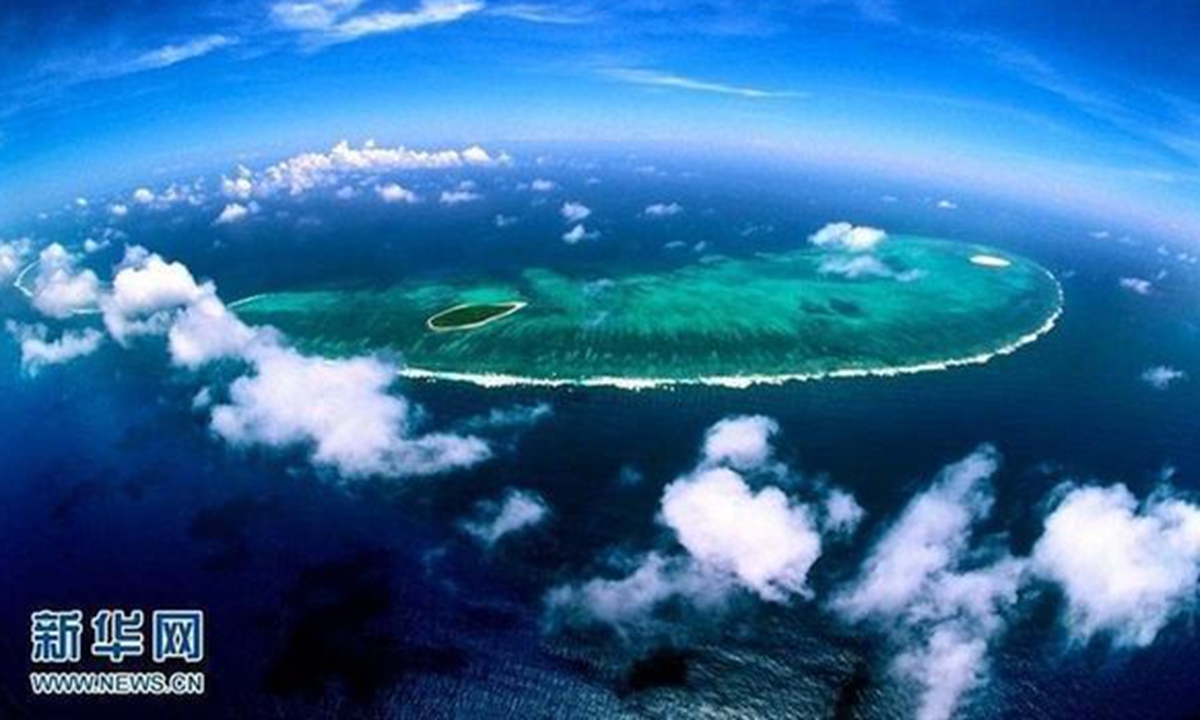US sanctions won't deter China from seeking legal rights in S.China Sea, trade: experts
By GT staff reporters Source: Global Times Published: 2020/8/27 0:34:09

An aerial photo of the South China Sea. File photo: Xinhua
The US on Wednesday sought to further escalate tensions with China, as it moves to sanction two dozen Chinese companies that it claims help build artificial islands in the South China Sea, compounding several hot-button issues in the bilateral relationship, from the South China Sea to military to trade.
But experts described it as another "symbolic" move aimed at fanning anti-China sentiment in certain quarters of the US ahead of the heated presidential election that won't deter China from pursuing its legitimate territorial sovereignty and maritime rights and interests in the South China Sea and on trade.
The US commerce department announced on Wednesday the addition of 24 Chinese firms to the Entity List for helping build military islands in the South China Sea. The firms include five under China Communications Construction Company, some telecommunications companies from South China's Guangzhou, to North China's Tianjin.
Washington claims the firms are helping the Chinese government "reclaim and militarize disputed outposts in the South China Sea." The latest entity list will restrict export or re-export of the US goods to the named Chinese firms.
The US Department of State also said on Wednesday that it would impose visa restrictions on several Chinese individuals involved in the construction.
This is the first time that the US has used the entity list to sanction China over the South China Sea issue following similar moves over Hong Kong, and Xinjiang-related matters.
The sanction shows that the US is launching an all-round crackdown on China, be it on diplomatic, military and public opinion fronts, but it also means that its tricks have been exhausted, as restrictions imposed on Chinese companies involved in the South China Sea are having a very little impact on those companies, said Chen Xiangmiao, an assistant research fellow at the National Institute for South China Sea Studies.
Chen said that under souring ties between Beijing and Washington, it is difficult for employees of those companies to visit the US, so the sanction is symbolic, but won't change or stop China's stance on the South China Sea issue.
He added that the US has always been hyping China's construction on islands and reefs in the region; so the sanction is not a surprise to some Chinese experts, as Washington has ratcheted up its crackdown on China on trade, so-called human rights and other issues.
Chen assumes the newly released "symbolic" sanction may be another tactic of the Trump administration to play the "China card" to gain support, as the general election approaches. "Neither international society nor Americans are paying close attention to the South China Sea region. The new move is just 'testing the waters' to see if targeting the region will gain more votes," he told the Global Times.
After the restriction was released, US Secretary of State Mike Pompeo tweeted that "The US is taking action today to support freedom of the seas and to oppose coercion of our Southeast Asian allies and partners."
Chen said Pompeo's statement is aimed at fanning the flames for countries within the region to oppose China. "But those countries are unlikely to choose sides, as siding with one country will bring huge losses to those countries."
The fresh sanction is a reminder that simply shunning the US - a bully that gets addicted - no longer works, experts said, calling for precautions for all possibilities.
"Good intentions aren't enough. We must be well prepared to protect the legitimate interests of our companies," said Bai Ming, deputy director of the international market research institute at the Chinese Academy of International Trade and Economic Cooperation, a think tank under the Ministry of Commerce.
The push to move away from a US-centric road map, the pursuit of legal actions, and launching countermeasures are among the measures being considered to ensure the survival of the affected Chinese businesses, Bai told the Global Times on Wednesday.
He cited the legal action TikTok is taking against the Trump administration as a means of hitting back at US sanctions.
A greater focus on its domestic market, continued commitments to the Belt and Road Initiative, and a resolute push for breakthroughs in core technologies would be the key for China to build an indigenous innovation wall against the US-led crackdown on Chinese businesses and technologies, Bai said.
A report by the China Power Project at the US Center for Strategic and International Studies said the South China Sea carries an estimated one-third of global shipping. This is particularly critical to China, Japan and South Korea, all of which rely on the Strait of Malacca, which connects the South China Sea and, by extension, the Pacific Ocean to the Indian Ocean.
In 2016, the value of Chinese goods through the South China Sea reached $1.47 trillion, accounting for 39.5 percent of all trade through the sea, according to the report.
Despite unsubstantiated US claims of disruption to freedom of navigation, commercial navigation has not been disrupted over the past years, while China's trade with Southeast Asian countries is burgeoning day by day.
In the first half of the year, the Association of Southeast Asian Nations has emerged as China's largest trading partner amid the COVID-19 pandemic, with trade still rising.
Some experts have also said that it is the US that is seeking to undermine the peace and prosperity in the region for its own political and economic interests.
Posted in: POLITICS